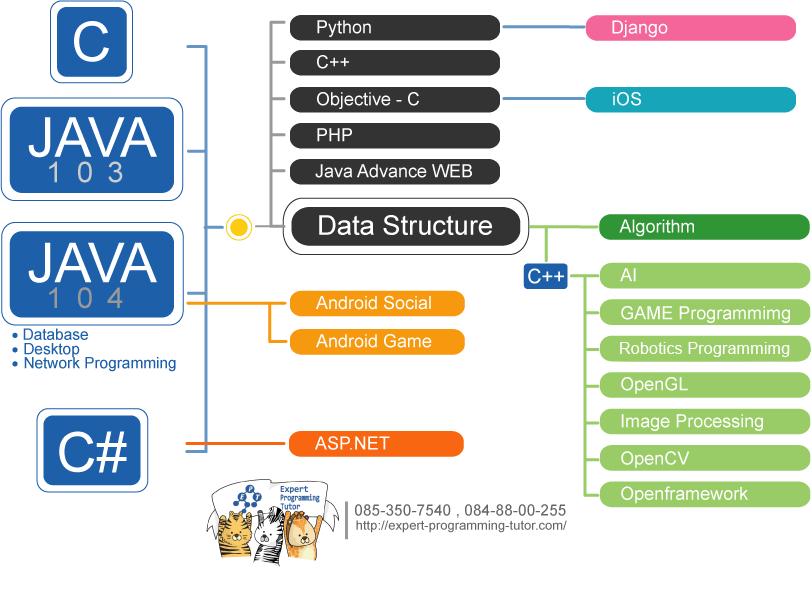JSON in Java: การใช้งาน Jackson และ GSON
การจัดการข้อมูลในรูปแบบ JSON กลายเป็นสิ่งสำคัญอย่างยิ่งในยุคปัจจุบัน ไม่ว่าจะเป็นการรับส่งข้อมูลผ่าน API, การจัดเก็บข้อมูลในฐานข้อมูล NoSQL หรือการทำงานร่วมกันระหว่างแอปพลิเคชันต่าง ๆ JSON (JavaScript Object Notation) ถูกออกแบบมาให้อ่านและเขียนได้ง่าย สำหรับผู้ที่ทำงานในภาษา Java มีเครื่องมือหลายตัวที่ช่วยให้การทำงานกับ JSON เป็นเรื่องที่เรียบร้อยและง่ายดาย หนึ่งในนั้นคือ Jackson และ GSON ซึ่งแต่ละตัวมีความสามารถและจุดเด่นที่น่าสนใจแตกต่างกันออกไป
ก่อนเราจะลึกลงไปที่ Jackson และ GSON ลองมาดูว่าทำไม JSON ถึงได้รับความนิยมขนาดนี้ JSON มีลักษณะเป็นข้อความที่สามารถอ่านได้โดยมนุษย์และสามารถแปลงข้อมูลเป็นโครงสร้างที่เข้าใจได้ง่ายในแบบของอ็อบเจกต์ ไม่ว่าจะเป็นการส่งข้อมูลแบบคู่ key-value หรือการรองรับข้อมูลที่ซับซ้อนมากขึ้น ตลอดจนสามารถใช้ในภาษาการโปรแกรมได้หลากหลาย
Jackson เป็นหนึ่งในไลบรารีรายแรก ๆ ที่ถูกออกแบบมาให้ทำการแปลงข้อมูล JSON ไปเป็น Java object และกลับกันได้อย่างง่ายดาย จุดเด่นของ Jackson คือความยืดหยุ่นและประสิทธิภาพในการทำงานกับข้อมูลจำนวนมหาศาล
วิธีการใช้งาน Jackson
1. การเพิ่ม Dependency:หากคุณใช้ Maven คุณสามารถเพิ่ม Jackson ลงใน pom.xml ได้ดังนี้:
<dependency>
<groupId>com.fasterxml.jackson.core</groupId>
<artifactId>jackson-databind</artifactId>
<version>2.12.3</version>
</dependency>
สมมุติว่าเรามี JSON ที่ต้องการแปลงเป็น Java Object:
{
"name": "John",
"age": 30
}
และเรามี Java class ดังนี้:
public class User {
private String name;
private int age;
// Constructors, getters, and setters
}
การแปลงสามารถทำได้ดังนี้:
ObjectMapper objectMapper = new ObjectMapper();
User user = objectMapper.readValue(jsonString, User.class);
การแปลง object กลับเป็น JSON สามารถทำได้ง่ายเช่นกัน:
String jsonString = objectMapper.writeValueAsString(user);
GSON พัฒนาโดย Google ถือเป็นอีกหนึ่งตัวเลือกยอดนิยมที่ใช้แปลง JSON ในโปรเจกต์ Java จุดเด่นของ GSON อยู่ที่ความเรียบง่าย และการใช้งานที่สะดวก ช่วยให้นักพัฒนาสามารถเข้าถึงและแปลงข้อมูลได้อย่างรวดเร็ว
วิธีการใช้งาน GSON
1. การเพิ่ม Dependency:เช่นเดียวกันกับการใช้ Maven คุณสามารถเพิ่ม GSON ลงใน pom.xml ได้ดังนี้:
<dependency>
<groupId>com.google.code.gson</groupId>
<artifactId>gson</artifactId>
<version>2.8.6</version>
</dependency>
Gson gson = new Gson();
User user = gson.fromJson(jsonString, User.class);
String jsonString = gson.toJson(user);
ประสิทธิภาพ
เมื่อเปรียบเทียบในแง่ของประสิทธิภาพ Jackson มักจะให้ความเร็วในการแปลงที่ดีกว่า GSON ในสถานการณ์ที่ต้องจัดการข้อมูลขนาดใหญ่
ความยืดหยุ่น
Jackson เน้นไปที่การให้ความยืดหยุ่นในการจัดการข้อมูล จึงเหมาะสำหรับโปรเจกต์ที่มีความซับซ้อนและต้องการการปรับแต่งมากขึ้น ในขณะที่ GSON มีจุดเด่นที่ความเรียบง่ายและเหมาะสมกับโปรเจกต์ที่ต้องการการใช้งานที่รวดเร็วและไม่ซับซ้อน
การใช้ Annotations
ทั้ง Jackson และ GSON สามารถใช้ annotations เพื่อกำหนดความประพฤติและการตั้งค่าได้ แต่ Jackson มี annotations ที่หลากหลายและครอบคลุมกว่า
การเลือกใช้ไลบรารีในการจัดการ JSON ขึ้นอยู่กับลักษณะและความต้องการของโปรเจกต์ หากโฟกัสไปที่ความเร็วและความยืดหยุ่น Jackson เป็นตัวเลือกที่ดี แต่หากต้องการความสะดวกและเรียบง่าย GSON ก็ยังคงเป็นตัวเลือกที่น่าสนใจอย่างยิ่ง
หากคุณสนใจเรียนรู้เพิ่มเติมเกี่ยวกับการเขียนโปรแกรม Java หรือการทำงานกับ JSON สามารถพิจารณาศึกษาเพิ่มเติมได้ที่ Expert-Programming-Tutor (EPT) ที่จะช่วยให้คุณสามารถเป็นผู้เชี่ยวชาญในด้านนี้ได้อย่างมั่นใจ!
หมายเหตุ: ข้อมูลในบทความนี้อาจจะผิด โปรดตรวจสอบความถูกต้องของบทความอีกครั้งหนึ่ง บทความนี้ไม่สามารถนำไปใช้อ้างอิงใด ๆ ได้ ทาง EPT ไม่ขอยืนยันความถูกต้อง และไม่ขอรับผิดชอบต่อความเสียหายใดที่เกิดจากบทความชุดนี้ทั้งทางทรัพย์สิน ร่างกาย หรือจิตใจของผู้อ่านและผู้เกี่ยวข้อง
หากเจอข้อผิดพลาด หรือต้องการพูดคุย ติดต่อได้ที่ https://m.me/expert.Programming.Tutor/
Tag ที่น่าสนใจ: java c# vb.net python c c++ machine_learning web database oop cloud aws ios android
หากมีข้อผิดพลาด/ต้องการพูดคุยเพิ่มเติมเกี่ยวกับบทความนี้ กรุณาแจ้งที่ http://m.me/Expert.Programming.Tutor
085-350-7540 (DTAC)
084-88-00-255 (AIS)
026-111-618
หรือทาง EMAIL: NTPRINTF@GMAIL.COM
